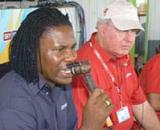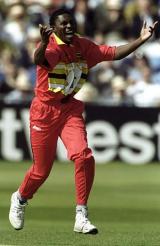
|

Pommie Mbangwa in the commentary box during the first ODI in Antigua
© The Nation
|
|
At the age of 29 most cricketers are in the prime of their career. Not many - none really - are commentators. The one exception - Pommie Mbangwa.
His is an interesting story. Instead of being a seasoned fast bowler for Zimbabwe, he is slowly becoming an established analyst in the commentary box. He comes across as a seasoned performer there - articulate, smooth-talking and knowledgeable, the dream of a television viewer. Where he is today was something that came more by chance and not by choice.
While he was among the Zimbabwe reserves a few years ago, he was asked
to come into the commentary box to do an interview and the television producers were so impressed that they made another request of him in the next match a few days later.
As he continued to find it hard to force his way back into the Zimbabwe team, he was asked to do a few stints of "guest commentary". "At the start, I really didn't want to because my mind was on playing. At the time, I was looking at ten more years of international cricket, but it just didn't work out," he told Midweeksport.
"I'd started off. They'd asked me again and again and I'd be thinking 'no I don't want to do it'. I wanted to focus on bowling. I needed to go out and practice my bowling. But after a couple of years of not being in the side and you're still playing ... in Zimbabwe, you've got to understand that we weren't playing a lot of cricket at the time and if you're not in the national team on tour, you're not playing too much cricket.
"You don't get too much opportunities to improve and get yourself back in the side. This was another avenue, a way to stay close to the game."
There is a feeling that some players feel the job of a commentator is easy. Some, however, quickly find out about the challenges when they make the switch from the middle to the microphone.
Mbangwa was one of those who never really struggled. It always seem as if he has been doing this for his whole life. "It's not very easy. The difficulty is to articulate what you think or what you thought when you were on the field so that the person sitting in their living room can understand or relate to what's happening at the time.
"The transformation for me hasn't been too difficult. I speak about the way I think things should be done from a perspective of when you're on the field and you try and do things in a certain way. The reason commentary teams are good to listen to is because they come from different teams initially and had different ways of doing things while they were playing."

|

Mbangwa celebrates an England wicket in 1999
© Getty Images
|
|
Even in his early days in the commentary box, he won many admirers.
It's not only because of his good looks, but his wonderful delivery and expert knowledge. It's almost hard to believe he has not had any formal training.
"Many players would like for there to be formal training," he said.
"I'm sure there are a lot of people who want to take it up. It goes from whether you go to school and learn the language side of things. I would call it a gift. I just talk how I talk normally - when this recorder is not on, you and me chatting, I would just chat in that way and if it comes across nicely, it comes across nicely."
While his passion for the game still remains and he badly wanted to make it as a cricketer, he has no regrets of making the switch to beyond the boundary. This is now his bread and butter. He is a broadcaster by profession.
"To be honest, I haven't had any regrets," he said. "At the time of things happening and me moving from being on the field to moving off it, I still wanted to play. All I had in my mind was actually playing. Asked whether this is first prize, I'd say no. If I were to be given a choice, I would choose to play, but from my circumstance, the way things happened in my life, I don't think I had that choice when I stopped playing."
He definitely wanted to play more than 15 Tests (32 wickets at 31.43 each) and 29 One-Day Internationals (11 wickets at 103.63 each). He was 20 years old when he played his first international match and 26 when he played his last. His final match for Zimbabwe was in the 2002 Champions Trophy. Prior to that his previous chance was in 2000.
"In between, there were lots of things that happened in my life which gave me some sort of intelligence to make a calculated decision, one that I could live with. I'm quite comfortable and happy," he said. "The Zimbabwe cricket story is well documented. I wasn't able to improve sufficiently to stake a claim for a place in the team. That's one of the main things that made me retired informally. I just left. I just stopped playing.
"I didn't think there would be enough opportunity for me to run up and bowl, and be sufficiently improved to get back into an international side and be an improved bowler when I turn up. If you didn't command a place as the No. 1 bowler or the top six batters and couldn't play every single game, your opportunity to learn would be significantly less."
In contrast, he added, there were ample chances to improve in the commentary box.



